Reading the Duha Prayer: Arabic, Latin, Meaning, Procedure
Everyone must be very happy when doing charity. And it turns out that in Islam there is one practice that can replace the charity practice. This practice is dhuha prayer. The following is an explanation of the complete Duha Prayer.
Table of contents
Explanation & Time of Duha Prayer

Duha prayer is included in the category of sunnah prayers related to time. Because when you want to do this Duha sunnah prayer, it can only be done in the morning.
You can do this Duha Sunnah prayer after the Fajr prayer.
As we know, that the dawn prayer is done when the sun has not yet risen or before dawn comes. Meanwhile, the Duha prayer is carried out after dawn or the rising of the sun until the time for the dhuhur prayer comes.
Duha sunnah prayer is one of the sunnah prayers that is highly recommended by the Prophet. Where it is highly recommended to do at the time of dhuha.
Dhuha time itself is the time when the sun begins to rise approximately 7 cubits from time to time sunrise (around 07:00 am) to time of dhuhur (approximately at 12:00 o'clock noon).
1. Execution time
Duha prayer can be done starting from the time the sun rises until it is close to time zawal (the sun shifts to the west).
Al Lajnah Ad Da-imah (Fatwa Commission in Saudi Arabia) explained that the initial time for the Duha prayer is about 15 minutes after sunrise.
While Shaykh Muhammad bin Sholih Al 'Utsaimin explained if the implementation time is starting from the sun as high as a spear - when seen with the eye, until it is close to time zawal.
Then he also explained that the time starts about 20 minutes after sunrise, until 10 or 5 minutes before the time of the sun shifts to the west.
So, please adjust it to the sunrise in each area because we cannot provide exact hour information when the Duha prayer starts and ends.
And every day the sunrise time will also be different.
While for the main time to do the Duha prayer that is, at the end of time, which is when conditions get hotter. The arguments for that are:
أَنَّ زَيْدَ بْنَ أَرْقَمَ رَأَى قَوْمًا يُصَلُّونَ مِنَ الضُّحَى فَقَالَ أَمَا لَقَدْ عَلِمُوا أَنَّ الصَّلاَةَ فِى غَيْرِ هَذِهِ السَّاعَةِ أَفْضَلُ. إِنَّ رَسُولَ اللَّهِ -صلى الله عليه وسلم- قَالَ « صَلاَةُ الأَوَّابِينَ حِينَ تَرْمَضُ الْفِصَالُ ».
Meaning:
Zaid bin Arqom found a group of people who were performing the Duha prayer, then he said, “They may not know that apart from the time they are currently working on, there is more time main. Rasulullah SAW said, "(The best time) is the awwabin prayer (another name for the Duha prayer is prayer). for people who obey or return to obey) is when the camel is feeling the heat sun."
An Nawawi also said, "This is the main time that you can use to perform the Duha prayer. Likewise, the Shafi'iyah scholars say that this is the best time to perform the Duha prayer. Although it can also be done at sunrise until the time of Zawal.”
2. Ishaq prayer
Ishraq prayer is the Dhuha prayer that is performed at the beginning of time.
From Anas bin Malik radhiallahu'anhu, Rasulullah SAW said:
صلَّى الغداةَ في جماعةٍ ثم قعد يذكرُ اللهَ حتى تطلعَ الشمسُ ثم صلَّى ركعتيْنِ كانت لهُ كأجرِ حجَّةٍ وعمرةٍ. قال: قال رسولُ اللهِ صلَّى اللهُ عليهِ وسلَّمَ: تَامَّةٍ ، تَامَّةٍ ، تَامَّةٍ
Meaning:
"A person who prays the morning prayer in congregation, then he sits and remembers Allah until the sun rises. Then he prays two rak'ahs, then the reward he gets is the same as that of a person who goes for Hajj and Umrah. Rasulullah SAW said: perfect, perfect, perfect "(HR. Tirmidhi no. 586, authenticated by Al Albani in Silsilah Ash Shahihah no. 3403).
In the hadith it is stated that the prayer is two rak'ahs at sunrise. Which is also often called the Ishraq prayer.
This ishraq prayer is a dhuha prayer that is done at the beginning of time. In Mausu'ah Fiqhiyyah Kuwaitiyyah (27/220-221) says:
بتتبُّع ظاهر أقوال الفقهاء والمحدِّثين يتبيَّن: أنَّ صلاة الضحى وصلاة الإشراق واحدةٌ؛ إذ كلهم ذكروا وقتَها من بعد الطلوع إلى الزوال ولم يُفصِّلوا بينهما
Meaning:
"By studying the words of the fuqaha and hadith experts, it is clear that the dhuha prayer and the ishraq prayer are the same thing. Because they all say the time of implementation is at the time the sun rises until the zawal. And they don't make a difference."
So the dhuha prayer that is done at the beginning of its time is called the ishraq prayer.
The Law of Duha Prayer
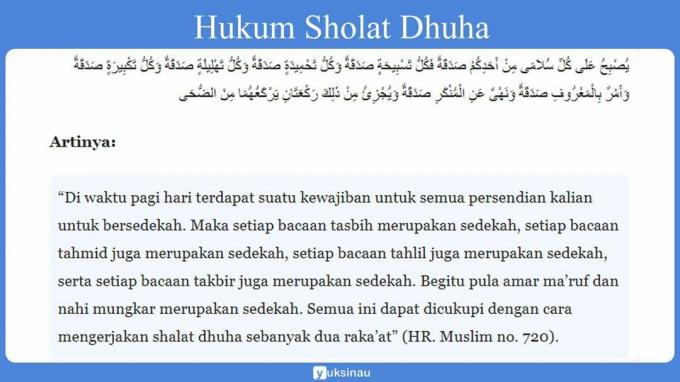
The four madhhab scholars agree that the implementation of the Duha prayer is sunnah. Among the arguments there is a hadith from Abu Dharr radhiallahu'anhu, Prophet sallallaahu 'alaihi wasallam which reads:
يُصْبِحُ عَلَى كُلِّ سُلاَمَى مِنْ أَحَدِكُمْ صَدَقَةٌ فَكُلُّ تَسْبِيحَةٍ صَدَقَةٌ وَكُلُّ تَحْمِيدَةٍ صَدَقَةٌ وَكُلُّ تَهْلِيلَةٍ صَدَقَةٌ وَكُلُّ تَكْبِيرَةٍ صَدَقَةٌ وَأَمْرٌ بِالْمَعْرُوفِ صَدَقَةٌ وَنَهْىٌ عَنِ الْمُنْكَرِ صَدَقَةٌ وَيُجْزِئُ مِنْ ذَلِكَ رَكْعَتَانِ يَرْكَعُهُمَا مِنَ الضُّحَى
Meaning:
“In the morning there is an obligation for all your joints to give charity. So every tasbih reading is a charity, every tahmid reading is also a charity, every tahlil reading is also a charity, and every takbir reading is also a charity. Likewise, amar ma'ruf and nahi munkar are alms. All this can be fulfilled by doing the Duha prayer as much as two raka'at" (HR. Muslim no. 720).
From Buraidah Al Aslami radhiallahu'anhu, the Prophet sallallaahu 'alaihi wasallam also said:
في الإنسانِ ثلاثُ مِئةٍ وسِتُّونَ مَفصِلًا؛ فعليه أن يتصدَّقَ عن كلِّ مَفصِلٍ منه بصدَقةٍ، قالوا: ومَن يُطِيقُ ذلك يا نبيَّ اللهِ ؟ قال: النُّخَاعةُ في المسجِدِ تدفِنُها، والشَّيءُ تُنحِّيهِ عن الطَّريقِ، فإنْ لم تجِدْ فركعَتا الضُّحَى تُجزِئُكَ
Meaning:
"Humans have 360 joints, which are obliged to give alms in each joint". The companions then asked, "Who is able to do this, O Prophet of Allah?". The Prophet said, "It is enough to cover the phlegm on the floor of the mosque with soil and remove the disturbance from the streets. If you can't find it, then you can do two rak'ahs of Duha prayer so that it can suffice for you." (HR. Abu Daud no. 5242, authenticated by Al Albani in Irwaul Ghalil [2/213]).
There is also a hadith from Abud Darda 'radhiallahu'anhu, he said:
أَوْصاني حبيبي بثلاثٍ لنْ أَدَعهنَّ ما عشتُ: بصيامِ ثلاثةِ أيَّامٍ من كلِّ شهرٍ، وصلاةِ الضُّحى، وأنْ لا أنامَ حتى أُوتِرَ
Meaning:
"My beloved (Rasulullah SAW) has instructed me not to leave three things as long as I am alive, These include: Fasting for three days every month, praying Duha and not sleeping until I perform the Witr prayer.” (HR. Muslim no. 722).
There is also a similar hadith narrated by Abu Hurairah radhiallahu'anhu, which reads:
أَوْصاني خليلي صلَّى اللهُ عليه وسلَّم بثلاثٍ: صيامِ ثلاثةِ أيَّامٍ من كلِّ شهرٍ، وركعتي الضُّحى، وأنْ أُوتِرَ قبل أن أرقُدَ
Meaning:
"My beloved (Rasulullah SAW) willed me three things: Fasting three days every month, two rak'ahs of Duha prayer and Witr prayer before I sleep" (HR. Bukhari no. 1178, Muslim no. 721).
According to the strongest opinion, the law of the Duha prayer is an absolute sunnah and can be routined.
Asy Syaukani said, "The hadiths that explain the recommendation to perform the Duha prayer are numerous and it is impossible to incriminate one another."
Meanwhile, for the argument that the Duha prayer is allowed to be regularized, it is the word of the Prophet SAW from 'Aisha, which reads:
أَحَبُّ الأَعْمَالِ إِلَى اللَّهِ تَعَالَى أَدْوَمُهَا وَإِنْ قَلَّ
Meaning:
"The most beloved of deeds to Allah Ta'ala are those that are continuous, even if they are small." 'Aisyah even when doing a practice always wanted to do it regularly.
The Importance of the Duha Prayer

The following are some of the virtues of the dhuha prayer, including:
- The reward is like giving charity
- Made a special door in heaven
- Sufficient for his needs
- All affairs made easy
- Face looks radiant
- Look young
- Rewarded with a house in heaven
- Healthy heart and kidneys
- Duha prayer as a form of alms
- Gaining Ghanimah or faster profits
- Aborting sin
- Get rewards for Hajj and Umrah
Other virtues of the Duha prayer are also mentioned in the hadith below:
عَنْ نُعَيْمِ بْنِ هَمَّارٍ الْغَطَفَانِىِّ أَنَّهُ سَمِعَ رَسُولَ اللَّهِ -صلى الله عليه وسلم- يَقُولُ « قَالَ اللَّهُ عَزَّ وَجَلَّ يَا ابْنَ آدَمَ لاَ تَعْجِزْ عَنْ أَرْبَعِ رَكَعَاتٍ مِنْ أَوَّلِ النَّهَارِ أَكْفِكَ آخِرَهُ ».
Meaning:
From Nu'aim bin Hammar Al Ghotofaniy, he heard the Messenger of Allah say, "Allah Ta'ala" said: O son of Adam, do not leave the four rak'ahs of prayer at the beginning of the day Duha time). Then it will suffice for you at the end of the day.”
The author of 'Aunul Ma'bud -Al 'Azim Abadi- also said, "The hadith can mean that the Duha prayer can also be a savior for the perpetrator from various things that can be dangerous. It can also mean if the Duha prayer can keep him from falling into sin or he will also be forgiven if he falls into it. Or the meaning can be wider than that.”
Total RDhuha prayer akaat
1. Without limit
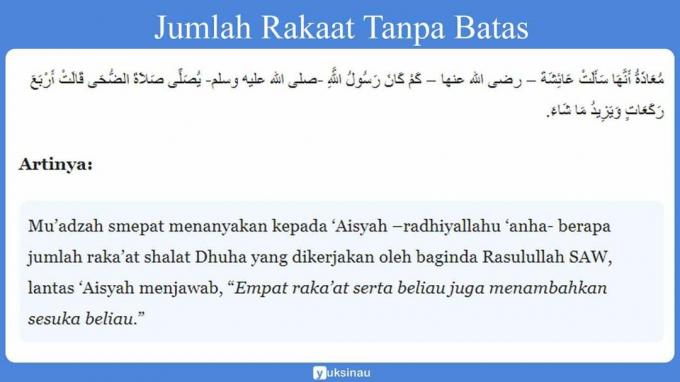
The number of raka'at in the Duha prayer, the minimum is two, while the maximum is without limit.
So you can do it only with two raka'at, four raka'at, and so on as long as the number of raka'at remains even.
But if you want to do more than two raka'at, the Duha prayer can be done every two raka'at greetings.
The evidence that states that the maximum number of rak'ahs is not limited is the following hadith:
مُعَاذَةُ أَنَّهَا سَأَلَتْ عَائِشَةَ – رضى الله عنها – كَمْ كَانَ رَسُولُ اللَّهِ -صلى الله عليه وسلم- يُصَلِّى صَلاَةَ الضُّحَى قَالَتْ أَرْبَعَ رَكَعَاتٍ وَيَزِيدُ مَا شَاءَ.
Meaning:
Mu'adzah once asked 'Aisyah - radhiyallahu 'anha - how many raka'at the Duha prayer was performed by the Prophet Muhammad, then 'Aisyah replied, "Four raka'at and he also added as he pleased.”
2. Maximum 8 Rakat
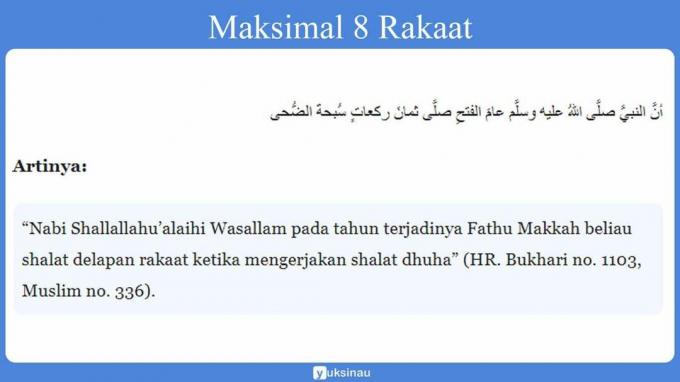
However, there are also opinions from scholars who made a mistake regarding the maximum level of the dhuha prayer cycle. The majority of scholars say that the maximum is eight cycles. Based on the hadith from Umm Hani 'the following:
أنَّ النبيَّ صلَّى اللهُ عليه وسلَّم عامَ الفتحِ صلَّى ثمانَ ركعاتٍ سُبحةَ الضُّحى
Meaning:
"The Prophet sallallaahu 'alaihi Wasallam in the year of the Mecca Fathu he prayed eight rak'ahs while doing the Duha prayer" (HR. Bukhari no. 1103, Muslim no. 336).
3. Maximum 12 Rakat

The Prophet once said:
َمَنْ صَلَّى الضُّحٰى اِثْنَتٰى عَشَرَةَ رَكْعَةً بَنَى اللهُ لَهُ قَصْرًا فِى الْجَنَّةِ
Meaning:
"Whoever has done the Duha prayer as much as twelve cycles, then Allah will make for him a palace in heaven" (H.R. Tirmidhi and Ibn Majah).
From the hadith above, it is explained that the number of rak'ahs in the Duha prayer is 12 cycles. But the 12 rak'ahs are the maximum number of rak'ahs performed during the dhuha prayer.
You can do these 12 rak'ahs in the process with every 2 rak'ah ending in greetings. Or it can also be done directly 4 rakaat and there is an initial tasyahud in the second rakaat, and also the final tasyahud in the fourth rakaat and then you end with greetings.
Prayer Procedures
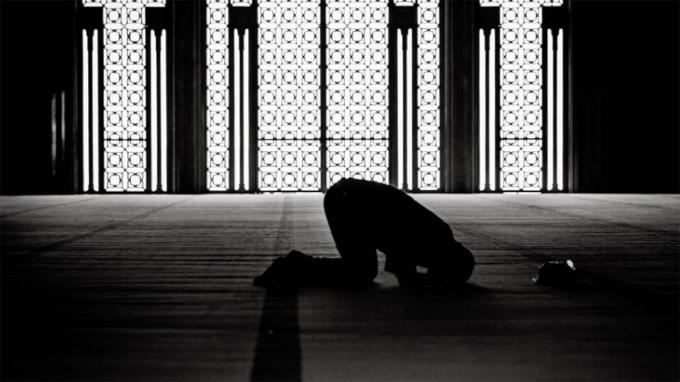
The procedure for the Duha prayer or the pillars of the Duha prayer is the same as the fard prayer or the other 2 rakaat sunnah prayers. What sets them apart is their intention.
The following is the procedure for praying Duha which consists of 2 rak'ahs:
First Pillars of Rakaat
- Reading Intentions for Dhuha Prayer
- Reading Takbiratul Ihram followed by iftitah prayer
- Read Surah Al Fatihah
- Reading letters from the Qur'an, the priority is Surah Asy-Syamsi
- Then Ruku with tumakminah
- Next do the Itidal movement
- Then the first prostration
- Sitting between the two prostrations
- Doing the second prostration
- Stand up again to perform the second rak'ah
Second Pillar of Rakaat
- Read Surah Al Fatihah
- Reading letters from the Qur'an, the priority is Surah Ad Dhuha
- Then Ruku
- Then Itidal
- Next do the first prostration
- Sitting between the two prostrations
- Then the second prostration
- Sit The final tahiyat
- And finally say hello
In the reading section of the surah after reading Surah Al Fatihah The scholars also agreed in recommending reading Surah Asy-Syamsi in the first rakaat and Surah Ad Dhuha in the second rakaat.
But there are also those who think that reading Surah Ad Dhuha in the first rakaat and Surah Al Ikhlas in the second rakaat.
However, there are no standard rules in reading what short surahs, because these things are re-adjusted by rote for people who are working on them.
Do Intention to pray Dhuha
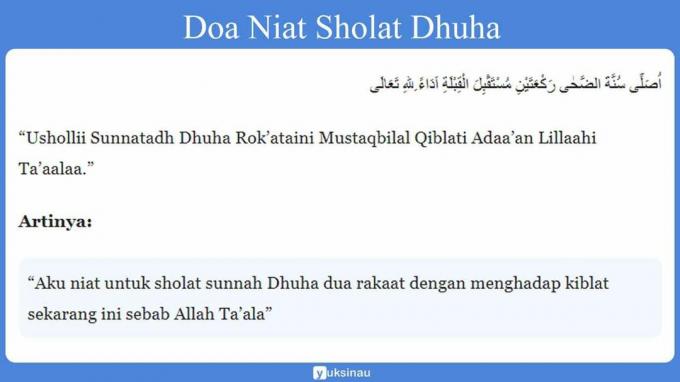
1. Duha Prayer Intentions
Like other sunnah prayers, everything starts with an intention. Likewise when you want to do the Duha sunnah prayer.
Before doing it must read Duha prayer intentions in your heart or in a low voice with the reading below.
Reading:
اُصَلِّى سُنَّةَ الضَّحٰى رَكْعَتَيْنِ مُسْتَقْبِلَ الْقِبْلَةِ اَدَاءً ِللهِ تَعَالَى
"Ushollii Sunnatadh Dhuha Rok'ataini Mustaqbilal Qiblati Adaa'an Lillaahi Ta'aalaa."
Meaning:
"I intend to pray the sunnah Dhuha two rak'ahs facing the Qiblah now because of Allah Ta'ala"
2. Dhuha prayer in congregation
Duha prayer can also be done in congregation occasionally. Shaykh Muhammad bin Salih Al Utsaimin said:
لا بأس أن يصلي الجماعة بعض النوافل جماعة ولكن لا تكون هذه سنة راتبة كلما صلوا السنة صلوها جماعة
"There is nothing wrong with doing some of the sunnah prayers in congregation, but it should not be used as a prayer." as a habit that is routine so that it will continue to do sunnah prayers in congregation. (Majmu' Fatawa war Rasa'il, 14/335).
If this Duha prayer is done in congregation, then you can do it by reading the Duha prayer prayer sirr (lowly).
Shaykh Abdul Aziz bin Baz also mentioned:
أما الصلاة النهارية كصلاة الضحى والرواتب وصلاة الظهر والعصر, فإن السنة فيها الإسرار
Meaning:
"As for the prayers that are performed during the day, for example the dhuha prayer, the caretaker prayer, the dhuhur prayer, the asr prayer, which are sunnah to be performed sirr (lowly)" (Fatawa of Ibn Baz, 11/207).
Bottom line:
- The main sunnah prayer is the sunnah prayer which is done by munfarid (alone) and it will be even more important if it is done at home. It is like the words of the Prophet SAW which reads:
فَصَلُّوا أَيُّهَا النَّاسُ فِى بُيُوتِكُمْ ، فَإِنَّ أَفْضَلَ الصَّلاَةِ صَلاَةُ الْمَرْءِ فِى بَيْتِهِ إِلاَّ الْمَكْتُوبَةَ
"Let you people pray (sunnah) in your homes because the best prayer is the prayer of someone who is done in his house unless it is an obligatory prayer." (HR. Bukhari no. 731)
- There are certain sunnah prayers that are prescribed in a congregational manner like the tarawih prayer.
- Other sunnah prayers - for example Duha prayer and tahajjud prayer - will be prioritized if they are done regularly munfarid and can be done in a congregation but not routinely or not continuously, but sometimes.
- If there is indeed a benefit to doing sunnah prayers in congregation as to teach others, then it will be more important to do it in a congregation.
Prayer Readings After Duha Prayer

اَللّٰهُمَّ اِنَّ الضُّحَآءَ ضُحَاءُكَ وَالْبَهَاءَ بَهَاءُكَ وَالْجَمَالَ جَمَالُكَ وَالْقُوَّةَ قُوَّتُكَ وَالْقُدْرَةَ قُدْرَتُكَ وَالْعِصْمَةَ عِصْمَتُكَ
اَللّٰهُمَّ اِنْ كَانَ رِزْقِى فِى السَّمَآءِ فَأَنْزِلْهُ وَاِنْ كَانَ فِى اْلاَرْضِ فَأَخْرِجْهُ وَاِنْ كَانَ مُعَسَّرًا فَيَسِّرْهُ وَاِنْ كَانَ حَرَامًا فَطَهِّرْهُ وَاِنْ كَانَ بَعِيْدًا فَقَرِّبْهُ بِحَقِّ ضُحَاءِكَ وَبَهَاءِكَ وَجَمَالِكَ وَقُوَّتِكَ وَقُدْرَتِكَ آتِنِىْ مَآاَتَيْتَ عِبَادَكَ الصَّالِحِيْنَ
"Allahumma innad-duhaa'a duhaa'uka wal bahaa'a bahaa'auka wal-jamaala jamaaluka wal-quwwata quwwatuka wal-qudrota qudratuka wal-'ismata 'ismatuka."
"Allaahumma in kaana rizqii fis-samaa'i fa anzilhu, wa in kaana fil-ardi fa akhrijhu, wa in kaana mu'assiran fa yassirhu, wa in kaana haraaman fa tahhirhu wa in kaana ba'iidan fa qarribhu bi haqqi duhaa'ika wa bahaa'ika wa jamaalika wa quwwatika wa qudratika, aatinii maa aataita 'ibaadakash-shalihiin."
Meaning:
"O Allah, indeed the implementation of Duha time is Your Duha time, greatness is your majesty, beauty is your beauty, strength is your strength, care is your your care"
"O Allah, if my sustenance is above the sky then send it down, if it is in the earth then take it out, if it is difficult then make it easy, if it is forbidden then purify it. if it is far, then bring it closer to the truth of Your dhuha, Your power (O my Lord), bring to me what You have brought to Your servants who pious".
Conclusion
Duha prayer is a prayer that you can do at the time after dawn or sunrise until the time for the midday prayer comes. Which practice of Duha prayer is the same as those who give charity and perform Hajj and Umrah.
The minimum number of rak'ahs is two rak'ahs. Meanwhile, according to some opinions, there are 8, 12, and no limit.
And lastly, for the procedure for the Dhuha prayer itself or the pillars of the Duha prayer, it is the same as for the fardhu prayer or other 2 rakaat sunnah prayers. It's just that the difference lies in the intention alone.
Question and answer
The following are some questions related to dhuha prayer, including:
The law of Duha prayer is an absolute sunnah and may be routine.
The minimum number of rak'ahs is two rak'ahs. Meanwhile, according to some opinions, there are 8, 12, and no limit.
Duha prayer can be done starting from the time the sun rises until it is close to time zawal (the sun shifts to the west).
The practice of dhuha prayer is the same as people who are giving alms, performing Hajj and Umrah.
Yes, but it can't be done.
Very acceptable and recommended. But with a note, if the office tasks have been carried out. Because carrying out the duties of superiors is obligatory while dhuha prayer is a sunnah practice.
